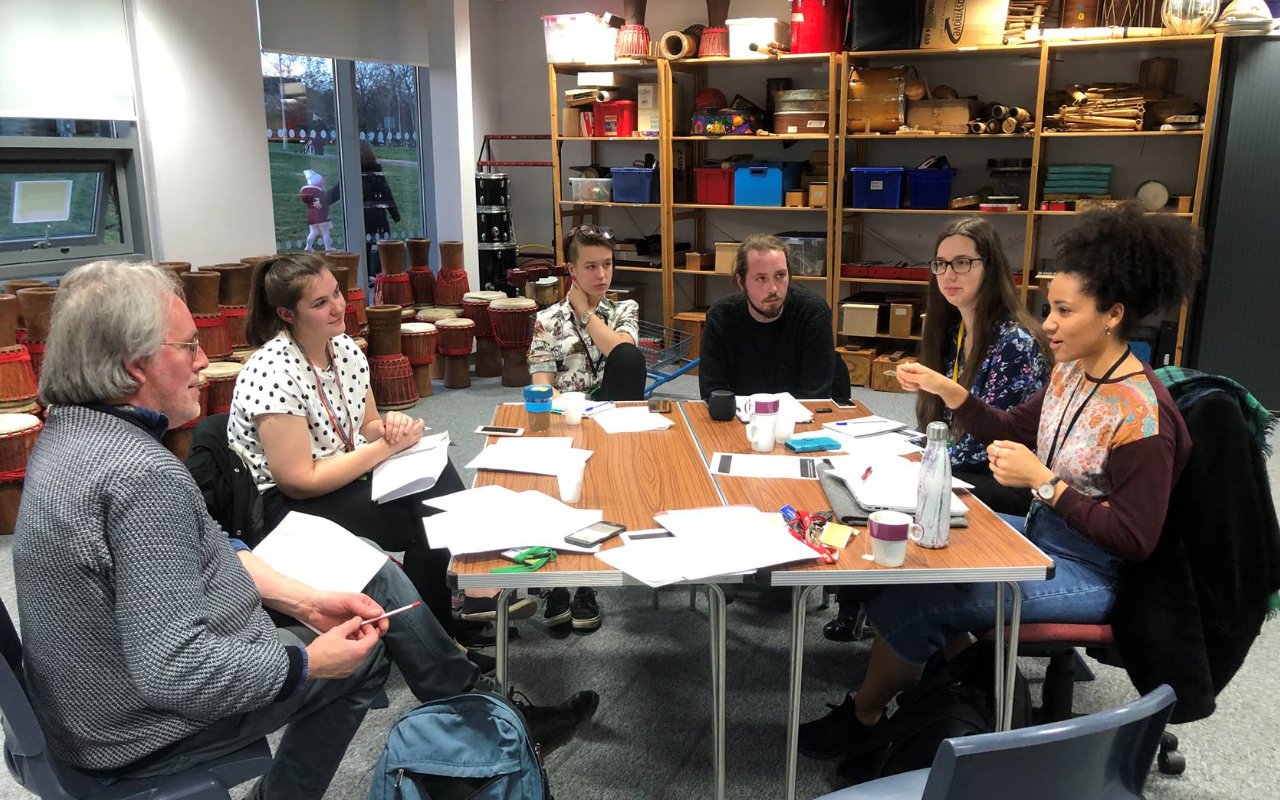
Changing Tracks critical reflection group
Photo: Christina Luchies
Music tutors leading change through critical reflection
To become genuinely inclusive, organisations need to find space to talk. Michael Davidson runs a music education programme where lived experience has been a catalyst for organisational change.
Hertfordshire Music Service (HMS) runs Changing Tracks, an England-wide programme of peer support and learning, training and consultancy for and with music services wanting to improve equality, diversity and inclusion. It is part of Youth Music’s Alliance for a Musically Inclusive England. While many music services lead music education hub networks, the focus of the programme is on the unique processes, culture and structures of music services as organisations.
From previous development projects we learned that focusing on ‘victory narratives’ – only talking about success – can become a barrier to development. So we wanted to create a space for music service leaders to speak openly about challenges as a source of learning. We also learned that, to be effective, development needs to be understood and embedded across different layers of organisations, and that inclusion is often highly valued by tutors with lived experience of difficulty.
Critical reflection groups for music tutors
Three years ago, HMS set up critical reflection groups to support music service tutors developing a pilot ‘creative nurture group project’ in primary schools in Stevenage. We knew working with young people with experience of trauma would be challenging. We set up meetings as safe spaces, where tutors could feel comfortable discussing challenges with their peers, and to adapt practice to the needs and interests of young people.
We began with training from trauma therapist Darren Abrahams, who described how inclusion and creating a safe space for children needs to start with tutors’ own wellbeing. We followed this up with regular critical reflection sessions where tutors applied the training to and reflected on their teaching practice.
Tutors have valued the welcoming and supportive space, a chance to learn from colleagues with different teaching practices, as well as feeling a greater sense of belonging in the organisation. Initially, we met just half-termly, because there were logistical challenges bringing tutors together from across the county. But during the first COVID lockdown in Spring 2020, we began meeting online weekly.
These sessions helped us feel connected and positive. As we were dialling in from our own homes, the conversations developed a less formal and more open quality. We realised that online critical reflection groups could be a way for other music services to provide consistent and regular support to tutors working with vulnerable young people.
Uncomfortable conversations about race
In one session a video of improvisatory community music practice prompted discussion about improvisation in music of the African diaspora. We watched a video by Bettina Love which brought a decolonial lens to the wider school curriculum in the USA. This coincided with the Black Lives Matter protests after the death of George Floyd and led to some initially uncomfortable conversations.
Two women of colour in the team critically challenged a statement that had been made by the local authority, wanting it to go further in taking an explicitly anti-racist stance. This was an example of how these groups can provide a space for tutors to influence and feed into wider organisational policy and strategy.
Forming an EDI working group
HMS had an Equality Diversity and Inclusion (EDI) action plan in place, but the discomfort in the session suggested we needed to take it forward more publicly and collectively. Our Chief Operating Office Lisa Quinlan Rahman invited me and the HR Director to form an EDI working group, and we invited everyone in the team to participate.
There was a lot of interest, and initial phone calls revealed many had rich lived experience of EDI issues they were keen to bring to the group. We invited written submissions outlining why they were keen to join and accepted all eight applications. We also included representatives from the local authority Diversity & Inclusion team, who wanted to link this work into their own strategy.
At our first session we shared how our own backgrounds sparked our interest in EDI, which led to some rich conversations. We also agreed formal terms of reference, including Chatham House rules, as we expected uncomfortable and challenging conversations.
Influencing organisational processes
The group is beginning to develop as a consultation space, where we apply an EDI lens to a range of organisational processes. At one session, a communications team member asked us to review the content of our schools’ brochure. Another invited feedback on our online lesson sign-up process. A third piece of work is considering any unconscious barriers to diversifying workforce that may exist in our recruitment processes.
It’s very early days and there’s still work to do tracking how the group’s suggestions flow into actions. But it has been a rich and powerful journey to increasing participation of diverse voices.
Michael Davidson is research lead for Changing Tracks.
![]() www.changingtracks.org.uk
www.changingtracks.org.uk
![]() @ChangingTracks1
@ChangingTracks1
![]() ChangingTracksHerts
ChangingTracksHerts
![]() @changingtracksherts
@changingtracksherts
Changing Tracks has launched a range of peer-group activities and CPD for music services, including an EDI bootcamp – see the website for more details.
Join the Discussion
You must be logged in to post a comment.